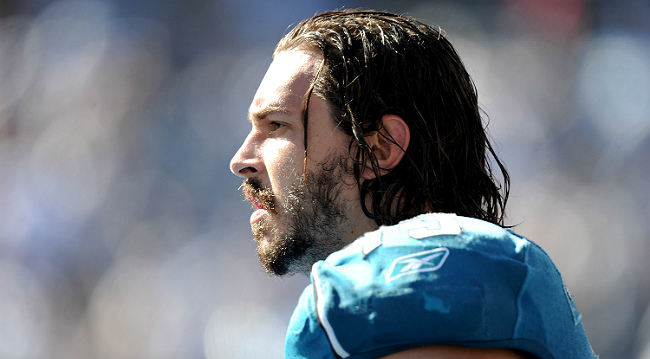
Former Jaguars and Bears offensive lineman Eben Britton is only 28 years old, but according to him, he’s finished as an NFL player thanks to a four-game suspension he was given after testing positive for Ritalin before this season. You may not remember his name because Britton was just one of hundreds of relatively anonymous NFL players who are always one bit of bad luck away from being out of the league. And that state of uncertainty causes those players to sacrifice everything just to stay in the league.
Britton has written a first-hand account of his struggles for The Cauldron, and it is absolutely harrowing. He started taking Adderall to help ignore the pain of a herniated disc, and here’s where it went from there:
I started taking Adderall regularly — chasing the dragon, as they say, always after the high you had the first time. I didn’t consider myself a drug addict. This was something that was prescribed to me. By a doctor. And given that there was a noticeable difference in my productivity whenever I took it, my usage was easy to justify.
The only downside, as I saw it, was the afternoon crash… Before long, I needed to smoke copious amounts of marijuana just to ease the comedown.
In hindsight, that wasn’t a good sign, but I couldn’t see clearly… By then, the league had already grown wary of prescribing painkillers to active players, but in my case (and in many, many other players’), Adderall wasn’t categorized by the same broad-brush approach.
Simply put, the drug helped me play through the pain. It was legal, and that was good enough for me.
I repeated that cycle over the next four(!) years. Adderall by day, weed by night. Each and every day riding the maelstrom of emotions and hormones. Ups and downs; cliffs and valleys; back and forth. For me, it was the only way of dealing with the physical and psychological grind of the game.
I felt liberation through medication.
Britton went through emotional turmoil because he was unsure of his place in the league, and he used Adderall as both a physical and mental coping mechanism. And he claims it’s extremely common.
It’s not hard to believe there’s an Adderall problem in the NFL, because it’s a symptom of the same disease that causes players to lie about concussions or take other painkillers or performance-enhancing drugs. And that disease is the non-guaranteed contract.
In the other major sports in America, when a player signs a contract, he can still be cut, but will still get paid at least a portion, or all, of that contract even if he’s not on the team. It’s because, you know, he signed a contract. But the NFL does not work like that for most players. Sure, large free-agent contracts often come with sizable guarantees, but even those are often less than half of the stated worth of the deal. Lower-profile players lose their paycheck the second they fall out of favor with the coaching staff. And that knowledge drives them to desperation, just like it did with Britton.
Adderall was prescribed for Britton by a doctor; it was perfectly legal for him to take it even as it became an addiction. You could argue it’s still a lesser evil than the pain meds that have come to define a bygone era of football, but those were also prescribed at alarming rates. Teams, once again, are fully complicit in reinforcing the “whatever it takes to get back on the field” mentality.
Adderall has become a problem because the NFL cracked down on its painkiller issue; it’s the most somber form of Whack-a-Mole you can imagine. But unless the NFL wants to completely change how it does business, it’s going to keep waging unwitting emotional warfare on its players, and it’s going to have to put one fire out after another. Britton has done us all a service by pulling back the curtain on this grotesque enterprise.
(Via The Cauldron)






